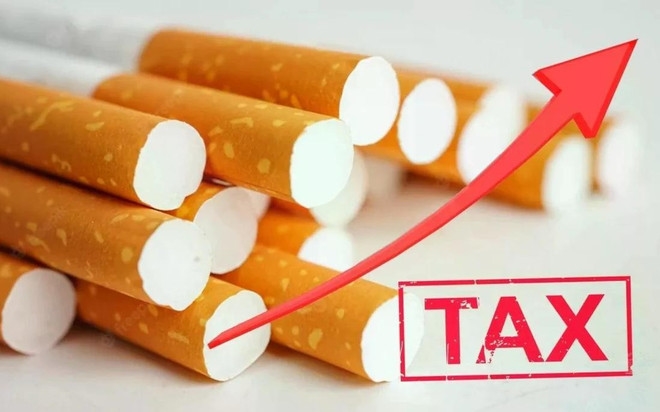A banner on the side of a car urges people to quit smoking for their own health and that of their loved ones (Photo: VNA)
As the National Assembly considers amending the Law on Special Consumption Tax in the second phase of its 9th session starting June 11, experts have called for a robust increase in tobacco taxes as the most effective measure to protect public health and reduce long-term harm, particularly among younger generations.
A 2023 report by the Vietnam Health Economics Association estimated that the total cost of tobacco-related healthcare and economic losses reached 108 trillion VND (4.14 billion USD) annually – equivalent to 1.14% of GDP and five times higher than the budget revenue generated by the tobacco industry. Around 45 million Vietnamese are currently at risk of tobacco-related illnesses, threatening the country’s human resources for sustainable development.
Research from the Development and Policies Research Centre (DEPOCEN), meanwhile, highlighted the severe health impacts of tobacco smoke, while nicotine adversely affects brain development and learning in children. Tobacco spending also accounts for nearly 2% of total household expenditure, a substantial burden. For low-income families, this spending can reduce investments in education and other essentials, directly undermining children’s rights to comprehensive development.
Nguyen Thi An, Country Director for HealthBridge Canada in Vietnam, noted that more than 40 domestic tobacco brands in Vietnam sell for less than 10,000 VND per pack – cheaper even than a small box of milk. This low price point makes them easily accessible, particularly to youths and those with low incomes.
Experts warned that teenage smoking habits will have severe long-term health consequences over the next 10 – 20 years as these young smokers begin to feel the full effects of tobacco use.
Since January 1 this year, Vietnam has banned the production, trade, import, transport, and use of e-cigarettes, heated tobacco products, and other harmful addictive substances. This measure, passed by the National Assembly on November 30, 2024, is aimed at safeguarding community health, especially that of young people.
Prior to the ban, the use of e-cigarettes among students aged 13 – 17 surged from 2.6% in 2019 to 8.1% in 2023, with the use among the 13 – 15 age group doubling in just one year. E-cigarettes contain nicotine and numerous harmful chemicals that damage the lungs, heart and nervous system, posing particular risks for adolescents.
 |
| Source: VNA |
Currently, tobacco taxes in the country account for only 36 – 38.8% of the retail price, well below the World Health Organisation (WHO)’s recommended minimum of 75% to effectively reduce tobacco consumption.
The draft amendment to the Law on Special Consumption Tax, due to be considered and voted on at the upcoming NA session, proposes two options. Option 1 introduces a fixed tax of 2,000 VND per pack in 2027, while Option 2 starts with a fixed tax of 5,000 VND per pack in 2026, both rising annually to reach 10,000 VND and 15,000 VND per pack by 2031, respectively.
The options are expected to raise the special consumption tax on tobacco to around 59.4% of the retail price by 2030, approaching the WHO’s recommended threshold.
Experts calculated that adopting the 5,000 VND-per-pack tax in 2026 and increasing it to 15,000 VND by 2030 could significantly reduce smoking rates while boosting government revenue for health and social development programmes. This approach could generate an annual additional 29 trillion VND in 2030, an increase of 169% compared to scenarios without tax increases.
Additionally, experts stressed the need for policies supporting farmers and workers in the tobacco industry to switch to more sustainable livelihoods, such as environmentally friendly agriculture and green industries./.